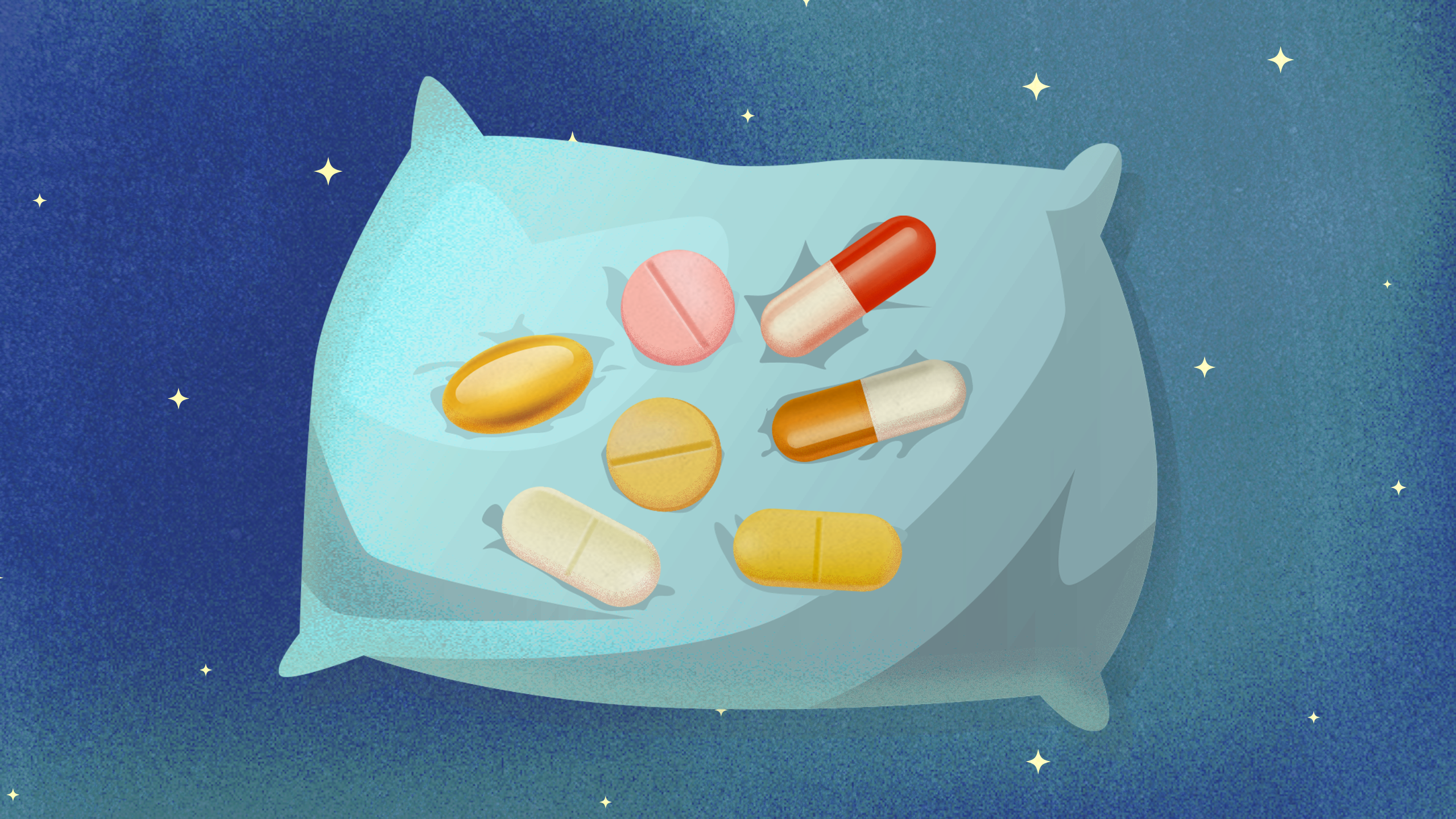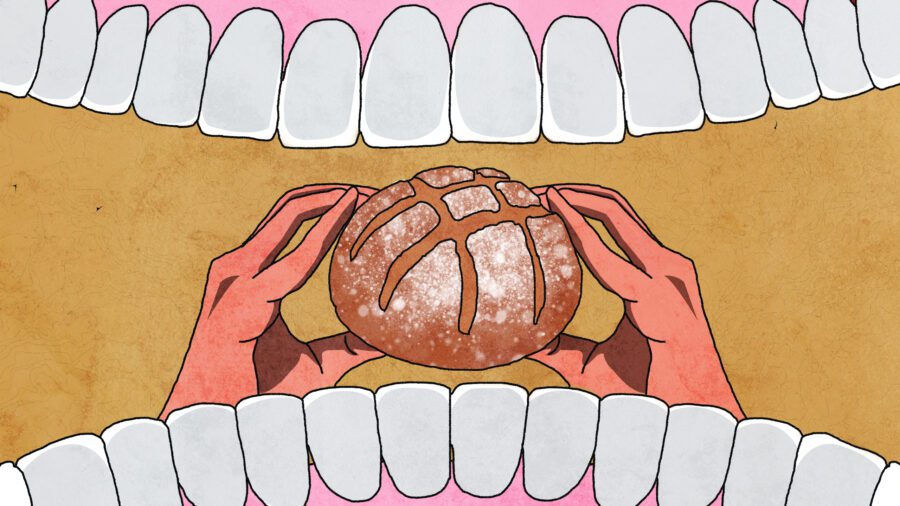
The 7 Best Vitamins to Naturally Promote Better, Uninterrupted Sleep According to Shawn Stevenson
Do you find yourself feeling tired but can’t sleep?
If you want to get the most out of your day, you need a great night’s sleep. During sleep, your body undergoes various essential functions such as repairing damaged tissues, regulating hormones, and consolidating memories. These functions are crucial for your physical, mental, and emotional health.
When you lack adequate sleep, it can lead to a range of negative consequences such as fatigue, irritability, poor concentration, and even impaired immune function. Additionally, researchers have linked chronic sleep deprivation to the development of various health conditions such as obesity, diabetes, and cardiovascular disease — which means high-quality, uninterrupted sleep is an absolute must.
The nutrients we consume play a vital role in regulating our sleep patterns and promoting restful sleep, and specific vitamins and minerals can help improve the quality and duration of sleep.
Health and wellness expert Shawn Stevenson specializes in helping others get the best night’s sleep possible, and he’s recommended seven key nutrients you can use to enhance your sleep quality. Here are seven must-have nutrients for optimizing your sleep quality today!
Join In 500 Million+ On The Journey to Greatness
Magnesium’s Impact on Your Sleep
Shawn Stevenson is a huge advocate for taking high-quality magnesium, a mineral that is essential for nerve function, muscle contraction, energy production, and quality sleep. Studies indicate magnesium can improve sleep quality and duration, particularly in insomnia patients.
One reason magnesium is so effective in assisting with sleep is that it activates the parasympathetic nervous system, promoting relaxation and helping you prepare for sleep.
We also need this crucial mineral to produce melatonin, a hormone that regulates the sleep-wake cycle. When magnesium levels are low, the body may struggle to produce enough melatonin, leading to insomnia or other sleep-related issues.
Plus, magnesium regulates a neurotransmitter called gamma-aminobutyric acid (GABA), which calms your brain and allows you to sleep.
Fortunately for us, getting enough magnesium isn’t too difficult. Foods such as leafy greens, nuts, seeds, and whole grains are all excellent sources of magnesium. And if you’re not getting enough through your diet alone, high-quality supplements are available as well.
However, it’s important to talk to your healthcare provider before starting any new supplements.
The Effects of Tryptophan on Your Body
Tryptophan is a fascinating amino acid that plays a vital role in our bodies. It’s what’s known as an essential amino acid, meaning that our bodies can’t produce it on their own. Instead, we must ingest it via supplementation or diet.
Studies show that increased tryptophan intake through food or supplements has a tremendously positive effect on sleep quality. This amino acid plays a role in producing serotonin, a neurotransmitter that regulates mood and appetite. Serotonin is also the precursor for serotonin and melatonin, so it’s critical for sleep.
Aside from its role in producing serotonin and helping you sleep, tryptophan aids us with other functions in our bodies. It’s a precursor to niacin as well, a B vitamin that plays a role in energy metabolism, DNA repair, and cell differentiation.
While tryptophan is present in many foods, some sources are better than others. Foods high in protein, such as meat, fish, and eggs, tend to be good sources of tryptophan. Vegetarians and vegans can also get tryptophan from plant-based sources such as tofu, leafy greens, broccoli, tempeh, beans, and nuts as well.
Vitamin C’s Role in Serotonin Production
Vitamin C is a nutrient well-known for its immune-boosting properties, but did you know it’s also essential for your sleep? The reason why vitamin C is so essential is because it’s involved in the process of converting tryptophan into serotonin.
In addition to aiding your sleep through the production of serotonin, vitamin C is a powerful antioxidant that can help reduce inflammation in the body. Chronic inflammation has been linked to various health issues, including sleep apnea, which can significantly impact the quality of your sleep.
Fortunately, getting enough of this essential nutrient is relatively easy, and you don’t need to take vitamin C at night to experience its exceptional benefits. Citrus fruits, berries, kiwi, papaya, pineapple, bell peppers, tomatoes, mango, and broccoli are all excellent sources of this nutrient.
Shawn Stevenson also recommends getting vitamin C from various sources, so consider incorporating many of these foods into your regular diet, as they can help you get the restful sleep you need to feel your best.
Why Calcium Intake is Good for Sleep
Calcium and sleep go hand in hand, as it’s a vital mineral that regulates your night’s rest. Like Vitamin C, calcium enables your body to convert tryptophan into serotonin. Plus, the mineral is necessary for producing and activating vitamin D, which also plays a role in sleep regulation.
Additionally, calcium helps regulate the function of the nervous system. The nervous system is responsible for transmitting signals between the brain and the body, and calcium enables these signals to be transmitted properly. When we have enough calcium, our muscles and nerves can relax properly, which can help us fall asleep more quickly and stay asleep longer.
Dairy products such as milk, cheese, and yogurt are a tremendous source of calcium, and these foods are also great for getting enough vitamin D and protein. If you’re lactose intolerant or vegan, leafy green vegetables — kale, spinach, and collard greens — almonds, chia seeds, sesame seeds, and soy products such as tofu can help you intake enough calcium.
Supplements are another option for getting enough calcium, although it’s important to talk to your doctor before taking any supplements to ensure they’re right for you.
How Vitamin D Optimizes Your Sleep Schedule
Vitamin D, also known as the “sunshine vitamin,” is a critical nutrient that plays many essential roles in our bodies. One of its key functions is to regulate our sleep-wake cycle, also known as our circadian rhythm.
A group of cells in the brain called the suprachiasmatic nucleus (SCN) control our body’s internal clock. The SCN regulates the release of melatonin, and Vitamin D helps to regulate the activity of the SCN, ensuring that melatonin is released at the right time to promote restful sleep.
Research also shows that vitamin D deficiency can lead to sleep disorders such as insomnia, restless leg syndrome, and sleep apnea. These conditions can cause difficulty falling or staying asleep, leading to poor sleep quality and daytime fatigue.
In addition to its role in regulating our sleep-wake cycle, vitamin D is important for overall health and wellness. It plays a crucial role in maintaining strong bones and teeth, supporting our immune system, and promoting healthy brain function.
There are several ways to ensure you get enough vitamin D. One of the best sources is sunlight, which triggers the production of vitamin D in our skin. However, numerous people struggle to get sufficient sun exposure to meet their daily vitamin D requirements, especially in the winter months or in areas with less sunlight.
Other sources of vitamin D include fatty fish like salmon and tuna, egg yolks, and fortified foods like milk, cereal, and orange juice. Supplements are also available for those who may have difficulty getting enough vitamin D through diet and sun exposure.
Selenium And Melatonin Regulation
Selenium is an essential mineral that heavily impacts our sleep and other aspects of our health. Various enzymes in your body need selenium in order to function properly, and these enzymes are involved in DNA synthesis, hormone production, and immune function.
One of the key ways that selenium helps us get better sleep is through its role in regulating melatonin production. Selenium enables enzymes to synthesize melatonin in the body, which means a deficiency in this mineral can lead to lower melatonin levels and disrupted sleep.
Increased selenium intake can also reduce symptoms of sleep disorders such as insomnia and restless leg syndrome.
Plus, it has other fantastic benefits like improved brain health and fertility and can reduce inflammation. Selenium’s anti-inflammatory effects can prevent diseases associated with chronic inflammation like heart disease and autoimmune disorders. It even serves as a powerful antioxidant that can help prevent several types of cancers including breast, prostate, lung, colon, and gastrointestinal.
While you can get selenium from supplements, you should strive to incorporate selenium-rich foods into your diet. Good dietary sources include Brazil nuts, sunflower seeds, cremini mushrooms, seafood, poultry, whole grains, and eggs.
It’s also important to note that though selenium is essential for good health, you need to get the right amount. Too little selenium can lead to deficiency and health problems, while too much can be toxic. The recommended daily intake of selenium varies depending on sex, age, and other factors, but most adults need around 55 micrograms per day.
The Effects Vitamin B6 Has on Sleep Patterns
Vitamin B6, known as pyridoxine, plays a critical role in many bodily functions. One of its key functions is its ability to support healthy sleep patterns.
Like with many of the nutrients we’ve already discussed, vitamin B6 is involved in melatonin production because it helps convert tryptophan into serotonin, leading to more restful sleep and a healthier sleep-wake cycle.
Vitamin B6’s anti-inflammatory and antioxidant properties may help reduce inflammation and oxidative stress in the body, leading to improved sleep quality. Oxidative stress is a condition that happens when there is an imbalance between the production of reactive oxygen species (ROS) — a subset of free radicals — and the body’s ability to detoxify them or repair the resulting damage. Antioxidants such as vitamin B6 combat harmful reactive oxygen species.
Adults typically need between 1.4 and 1.9 milligrams of vitamin B6 per day. The good news is that getting enough Vitamin B6 is not too difficult, and there are many foods that are rich in this essential nutrient. One of the best sources of vitamin B6 is animal proteins such as chicken, turkey, and fish.
If you’re vegetarian or vegan, there are still plenty of options for getting enough Vitamin B6 in your diet, too. Foods like soybeans, potatoes, bananas, chickpeas, tofu, and tempeh are all wonderful sources of this nutrient, as are leafy green vegetables like spinach and kale. You can also find vitamin B6 in nuts and seeds, such as sunflower seeds and pistachios.
Supplements are also a great option, but you need to ensure you don’t take too much vitamin B6, as it can lead to nerve damage over time. By ensuring adequate intake of vitamin B6 through a balanced diet or supplementation, you can support your body’s natural sleep processes.
Learn More Great Tools for Sleeping Peacefully
Shawn Stevenson recommends getting sufficient magnesium, tryptophan, vitamin C, calcium, vitamin D, selenium, and vitamin B6 to get the best sleep possible, but you should also consider incorporating different practices into your routine to further improve your sleep such as regular exercise and meditation.
Additionally, it’s crucial to note that these nutrients and routines are not a cure-all for sleep disorders. Conditions such as insomnia, sleep apnea, and narcolepsy often require medications and treatments. If you continue struggling to fall asleep, you may need to consult a healthcare professional to determine the best course of action.
If you’re interested in learning more about getting a great night’s sleep, you can check out Shawn Stevenson’s podcast The Model Health Show and his book Sleep Smarter: 21 Essential Strategies to Sleep Your Way to a Better Body, Better Health, and Bigger Success.
Plus, you can check out other great articles on Greatness.com that can help you get the most out of your sleep.
A full night’s sleep is a beautiful thing, and we hope that these key nutrients enable you to get high-quality rest that empowers you to live with more joy and energy!
Greatness Authors
Greatness Authors is a collection of writers, thinkers, curiosity experts, and students of the world who are committed to bringing you the most up-to-date, impactful, and inspiring information surrounding Greatness topics.

Do You Have to Be a Morning Person to Be Successful? Here’s What Both Sides Have to Say

9 Reasons You’re Tired All the Time & How to 10x Your Energy

How to Have a Healthy Romantic Relationship Even if You Share Different Beliefs

The Science of Forming Healthy Habits & Letting Go of Bad Ones, According to Author James Clear

The Secret of Sourdough: Why This Bread Is Actually Great for Your Gut (Plus, How to Make Your Own!










